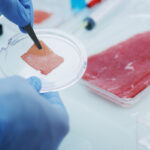Consumer warning: The troubling rise of “techno-foods”
 (NaturalHealth365) In recent years, we’ve witnessed an alarming trend: the invasion of our dinner plates by so-called “techno-foods.” These artificial creations, masquerading as healthier or more sustainable options, are rapidly filling grocery store shelves.
(NaturalHealth365) In recent years, we’ve witnessed an alarming trend: the invasion of our dinner plates by so-called “techno-foods.” These artificial creations, masquerading as healthier or more sustainable options, are rapidly filling grocery store shelves.
But are they really the solution to our food challenges, or just another way for big corporations to pad their bottom lines while making people sick?
The dubious origins of fake food
Let’s rewind to two decades ago when agri-giant Monsanto (now Bayer) introduced genetically modified crops resistant to their herbicide, glyphosate. They touted it as a way to reduce pesticide use. Fast-forward to today, and we’re grappling with glyphosate residues in our food supply and mounting concerns about its potential health impacts, including links to non-Hodgkin’s lymphoma.
This herbicide once praised as a farming revolution, is now found at alarming levels throughout our food chain, from cereals to wine. Moreover, nature has fought back with “superweeds,” forcing farmers to use even more potent chemical cocktails. This pattern of prioritizing profit over health continues with the latest wave of techno-foods.
Frankenfood on your plate
Take the much-hyped plant-based meat alternatives. Companies like Impossible Foods are pushing products that are essentially processed concoctions of isolates, concentrates, and a laundry list of unwanted additives. Peek at the label of an Impossible Burger, and you’ll find a dizzying array of ingredients – many of which you’d be hard-pressed to pronounce, let alone recognize as food.
Then there’s the emerging “lab-grown” meat industry. It cultivates animal cells in a soup of growth factors and synthetic nutrients. While it claims this will solve the environmental issues of traditional animal agriculture, we’re left to wonder about the long-term effects of consuming meat grown in a petri dish.
Even your glass of milk isn’t safe
The techno-food invasion doesn’t stop at solid foods. Now, we’re seeing “synthetic biology” or “synbio” milk hitting the market. These products are created by genetically modifying yeast, bacteria, or fungi to produce milk proteins. The companies behind these franken-milks insist they’re identical to cow’s milk proteins, but studies have shown significant differences in amino acid composition.
Moreover, synthetic milk often lacks the full spectrum of nutrients found in traditional milk. It introduces dozens of novel molecules into our diets without a clear understanding of the long-term consequences.
Protecting yourself from the techno-food takeover
So, what can conscientious consumers do in the face of this onslaught?
- Read labels always: If you can’t pronounce it, don’t eat it.
- Choose whole, unprocessed foods: Nature knows best when it comes to nutrition.
- Support local, organic farmers: This helps ensure a supply of real, unadulterated food.
- Grow your own: Even a small garden can provide you with fresh, natural produce.
- Stay informed: Keep up with independent research on these new food technologies.
What’s the bottom line?
While techno-foods may promise convenience, sustainability, or cost savings, they come with significant unknowns. Are we really willing to be guinea pigs for the food industry’s latest profit-driven experiments? Instead of embracing these artificial alternatives, we should be focusing on improving our current food system – promoting sustainable farming practices, reducing food waste, and ensuring access to real, organic, wholesome food.
Remember, just because something is on the grocery store shelf doesn’t mean it belongs in your body. Stay vigilant, choose wisely, and prioritize your health over food industry profits.
Sources for this article include:



